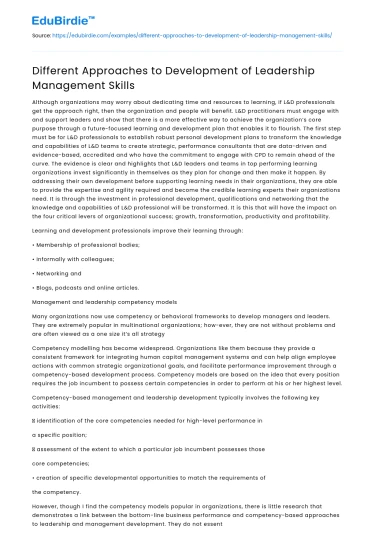Introduction
The development of leadership management skills is a critical component of organizational success and personal professional growth. Leadership is not a static skill but a dynamic capability that requires continuous refinement and adaptation to ever-evolving challenges. The question of how best to cultivate these skills has been the subject of extensive research and debate among scholars and practitioners alike. This essay explores various approaches to leadership development, examining their effectiveness and applicability within different contexts. Each method offers unique insights and benefits, yet they also present distinct challenges and limitations. By analyzing these approaches, we can gain a deeper understanding of how to effectively nurture leadership skills in diverse environments.
The landscape of leadership development is vast and varied, reflecting the complex nature of leadership itself. This complexity necessitates a multifaceted approach that considers individual differences, organizational needs, and cultural contexts. As we delve into these strategies, we also consider counter-arguments and criticisms to provide a balanced perspective on their effectiveness. The subsequent sections will detail experiential learning, formal education and training, and mentorship as key approaches to leadership skill development.
Save your time!
We can take care of your essay
- Proper editing and formatting
- Free revision, title page, and bibliography
- Flexible prices and money-back guarantee
Experiential Learning in Leadership Development
Experiential learning is a powerful method for developing leadership skills, rooted in the principle that individuals learn best through direct experience. According to Kolb's Experiential Learning Theory, learning is a process whereby knowledge is created through the transformation of experience. This approach is particularly effective in leadership development as it allows individuals to practice and hone their skills in real-world settings. For example, project-based assignments and leadership roles within organizations provide opportunities for leaders to confront challenges, make decisions, and learn from the outcomes. A study by McCall, Lombardo, and Morrison (1988) highlights that 70% of leadership development happens through challenging assignments and job experiences.
However, experiential learning is not without its challenges. Critics argue that without proper guidance and reflection, individuals may not derive the intended lessons from their experiences. This underscores the importance of structured reflection and feedback mechanisms to ensure that learning is effectively consolidated. Moreover, experiential learning may not always be feasible in high-stakes situations where the cost of failure is significant. Despite these limitations, the hands-on nature of experiential learning fosters adaptability and problem-solving skills, essential traits for effective leadership.
Transitioning from experiential learning, the next section examines formal education and training programs, which offer structured frameworks for leadership development. These programs complement experiential learning by providing theoretical foundations and a broader understanding of leadership principles.
Formal Education and Training Programs
Formal education and training programs are another cornerstone of leadership development, offering structured environments where individuals can learn and practice leadership concepts. Such programs often include workshops, seminars, and degree courses in leadership and management, designed to impart both theoretical knowledge and practical skills. Institutions like Harvard Business School and INSEAD offer renowned leadership courses that attract aspiring leaders from around the world. A study by Avolio, Avey, and Quisenberry (2010) suggests that formal training can improve leadership effectiveness by up to 25%.
These programs provide a comprehensive understanding of leadership theories, models, and best practices. They also facilitate networking opportunities and knowledge exchange among participants from diverse backgrounds. However, critics argue that formal education may lack the personalized touch and adaptability to individual learning styles. Additionally, the theoretical nature of classroom learning may not fully capture the complexities of real-world leadership challenges. To mitigate these issues, hybrid approaches that integrate experiential learning elements with formal education are gaining popularity.
As we explore further, the role of mentorship in leadership development emerges as a critical factor. Mentorship bridges the gap between theory and practice, offering personalized guidance and insights from experienced leaders.
Mentorship as a Leadership Development Tool
Mentorship is a time-honored approach to developing leadership skills, where experienced leaders provide guidance, support, and feedback to less experienced protégés. This relationship fosters a conducive environment for learning and growth, allowing mentees to benefit from the mentor's experiences and wisdom. According to Clutterbuck and Lane (2004), effective mentorship can accelerate leadership development by providing insights that are not readily available through formal education or independent learning.
Mentorship offers several advantages, including personalized feedback, increased self-awareness, and exposure to diverse perspectives. It also helps in building confidence and resilience, essential attributes of effective leaders. However, the success of mentorship largely depends on the compatibility between mentor and mentee and the quality of the relationship. Critics point out that finding suitable mentors can be challenging, and mentorship programs may lack structure and consistency. Despite these challenges, organizations are increasingly recognizing the value of mentorship and implementing formal mentoring programs to support leadership development.
The concluding section synthesizes the insights gained from these approaches and considers their implications for future leadership development initiatives.
Conclusion
In conclusion, the development of leadership management skills is a multifaceted endeavor that requires a combination of approaches to address the diverse needs of individuals and organizations. Experiential learning, formal education and training, and mentorship each offer distinct advantages and face unique challenges. The effectiveness of these approaches is enhanced when they are integrated, providing a holistic framework for leadership development. As organizations continue to operate in increasingly complex and dynamic environments, the demand for well-rounded leaders who can navigate these challenges will only grow.
Future leadership development initiatives should emphasize flexibility and adaptability, recognizing that there is no one-size-fits-all solution. By leveraging the strengths of different approaches and addressing their limitations, organizations can cultivate a new generation of leaders equipped to drive innovation and success. As we continue to explore and refine these strategies, the ultimate goal remains to empower individuals to reach their full leadership potential, thereby contributing to both personal and organizational growth.






 Stuck on your essay?
Stuck on your essay?

